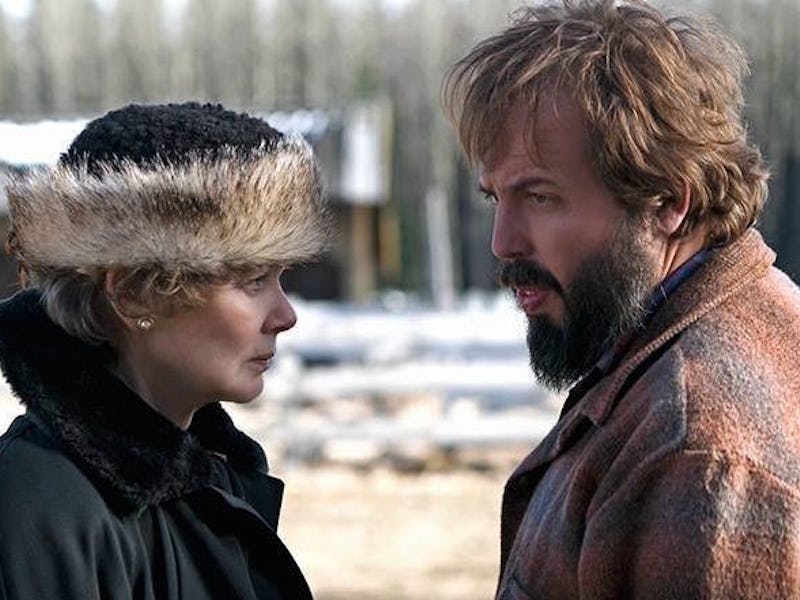'Fargo' Season 2 Ep. 7, Through a Jethro Tull Lens
The opening montage of last night's episode features a prominent usage of Jethro Tull's "Locomotive Breath," with a deep dramatic resonance.

The opening credits for last night’s Fargo featured a montage. which took stock of our characters following last week’s bloodbath. We learn, to our surprise, that Floyd and Simone are still alive. We see Otto Gearhart being buried, and an open grave for the still-missing body of Rye Gearhart. We see some of Kansas City’s main men gunned down — meanwhile, Mike Milligan and the twins are reeling from the aftermath. Dodd, Hanzee, and the Blomquists are all AWOL. There is a respite in the war between the two syndicates, the Blomquists and the police, but every faction is broken up from one another in some way, or turning against themselves.
The blaring accompaniment to the montage is the 1971 Jethro Tull FM staple “Locomotive Breath.” The very simple, overarching trajectory of anything in the extended universe of the Coen Brothers — and this, Noah Hawley’s offshoot show — is the archetypal “downward spiral,” and this is Tull’s chosen theme as well. The song — backed by a chunky acoustic guitar strum mimicking the churn of a steam locomotive — paints the story of a man’s life falling apart using the central metaphor of a train run amok. The brake handle has been broken off — by conductor “Old Charlie” who later transmogrifies into “God” himself as the song builds to a fierce climax — “No way to slow down,” repeated ad infinitum.
Tull’s “all-time loser” is, perhaps, an effective composite of everyone left alive on Fargo. They are running scared, fearful of impending doom: From Solverson and Hank, unsure of the war ahead and the fate of Betsy, to Milligan, unsure of his continuing status in the Kansas City operation and how to fire back against the Gearharts, to Floyd and Bear, with no sense of how to keep the family outfit intact with Otto dead and Dodd missing in action.
There are details of Tull’s song that eerily mirror those of last night’s episode. The “all-time loser” sees “his children jumping off at the stations one by one,” recalling the Gearhart’s loss of the entirety of their younger generation — first Rye, then Simone, who is either shot or banished by Bear in the woods towards the end of the episode. They have both, in their own way, vanished, both casualties and instigators of the snowballing entropy.
Tull’s protagonist also sees “his woman and his best friend/In bed and having fun”; the metaphor can’t be directly applied to the show, but it is Simone’s escapist sexual escapade with Milligan that forces Bear to mete out punishment. Dodd’s presence looms over this action — it’s both an obscure way of Bear getting back at Dodd for making Charlie his assassin, and a way of defending Dodd’s honor. Simone is not only Dodd’s daughter, but — we are being pushing toward inferring — an object of sadistic lust. Jealousy and anger dominates Bear’s action towards Simone in this episode, as well as Dodd’s throughout the show.
The Fargo ensemble, cumulatively, realizes how powerless they are to control anything around them. Everything has slipped out of their grasp, and they take their own uncharacteristic initiative in trying to restore some order, at any cost. Floyd pays snitch, Milligan rebels against the Kansas City leadership, Bear desperately grasps for the reins, and Solverson and Hank struggle to figure out how to run a many-tentacled case of which only they fully understand the details. Tull lead singer and flautist Ian Anderson said in 2013 that he wrote “Locomotive Breath” loosely about population expansion. He said he wanted the song to evoke the feeling of overcrowding — the “rather claustrophobic feel of a lot of people in a limited space.” In Fargo, too, there are too many cooks in the kitchen, killing for possession of mere scraps of turf and obscure honor, and forced to assume an every-man-for-himself mentality as the world around them threatens to squeeze them out.